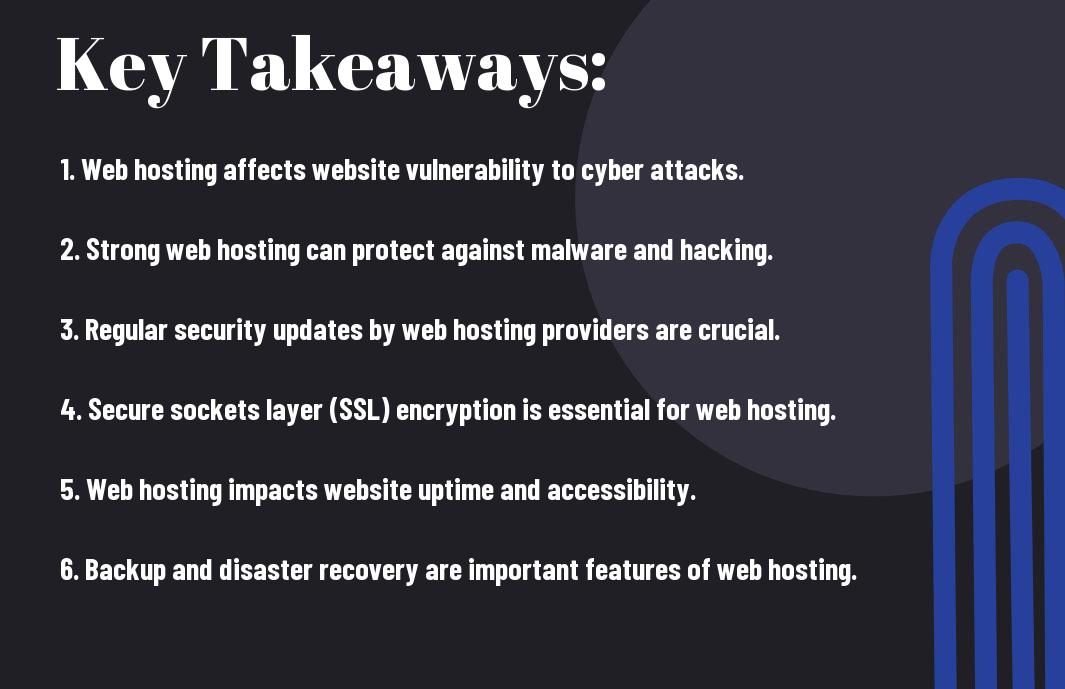Ensuring robust website security is crucial for the protection of your online presence. When it comes to fortifying your website against cyber threats, the choice of web hosting plays a pivotal role in your overall security strategy. By selecting a reliable and secure web hosting provider, you can significantly minimize the risk of potential security breaches and malicious attacks on your website. In this blog post, we will delve into the essential role of web hosting in maintaining the security of your website, and we will provide you with valuable insights on how you can enhance your website security through a strategic approach to web hosting.
Key Takeaways:
- Web hosting plays a critical role in the security of a website. The type of web hosting service and its security measures can directly impact the vulnerability of a website to cyber threats.
- Secure web hosting can provide features such as SSL/TLS certificates, regular security updates, and email scanning to protect websites from various forms of cyber attacks, including malware and phishing attempts.
- Investing in reliable web hosting with robust security protocols is essential for safeguarding sensitive data, maintaining customer trust, and preserving the integrity of a website in the digital landscape.


Understanding Web Hosting
Even before delving into the role of web hosting in website security, it’s important for you to have a clear understanding of what web hosting actually is. In the simplest terms, web hosting is the service that allows individuals and organizations to make their website accessible via the World Wide Web. Essentially, web hosting is the physical location of your website on the internet, as well as the technology that ensures it remains visible and accessible to visitors.
Types of Web Hosting Solutions
When it comes to web hosting solutions, there are several options available to you. The most common types include shared hosting, virtual private server (VPS) hosting, dedicated hosting, and cloud hosting. Each type of hosting solution has its own set of advantages and limitations, and the type you choose will depend on factors such as your website’s traffic volume, security needs, and budget.
- Shared hosting: This is the most affordable option, as your website shares server space with other websites. However, it may pose security risks due to the shared nature of the server.
- Virtual private server (VPS) hosting: With VPS hosting, your website is hosted on a virtual private server, offering more privacy and security than shared hosting.
- Dedicated hosting: This type of hosting provides you with an entire server solely for your website, offering the highest level of security and control.
- Cloud hosting: Cloud hosting involves hosting your website on a network of virtual servers, providing scalability and reliability.
- Recognizing the differences between these hosting solutions is essential in determining which one best suits your website’s security needs.
Components of a Secure Web Hosting Environment
When it comes to securing your website, the hosting environment plays a critical role. A secure web hosting environment includes several components such as firewalls, encryption protocols, secure data centers, regular backups, and 24/7 monitoring. By ensuring that your web hosting provider has these components in place, you can significantly reduce the risk of security breaches and data loss.
Threats to Website Security
Not all web hosting providers prioritize security, but it should be one of the most important factors to consider when choosing a hosting service. Your website’s security depends on the measures taken by your web hosting provider. Web hosting security is essential for any site, and you can learn more about it here.
Common Web Attacks and Vulnerabilities
One of the biggest threats to your website’s security is the risk of being targeted by common web attacks and vulnerabilities. These include but are not limited to phishing attacks, cross-site scripting, SQL injection, and DDoS attacks. It is crucial to be aware of these potential threats and take proactive measures to secure your website against them.
Importance of Regular Updates and Maintenance
Regular updates and maintenance play a critical role in maintaining the security of your website. Failure to update your website’s software, plugins, and other components can leave you vulnerable to security breaches. By keeping everything up to date, you reduce the risk of exploitation by cybercriminals, ensuring the overall security of your website.
Remember to always prioritize the security of your website, as it directly impacts your online presence and reputation. By understanding the threats to website security and taking proactive measures, you can protect your site from potential harm and maintain a secure online environment for you and your visitors. Stay informed and vigilant to keep your website safe and secure.
Best Practices for Secure Web Hosting
To ensure the security of your website, it is crucial to follow best practices for web hosting. These practices include choosing the right hosting provider and implementing security measures. If you’re wondering how a web host will ensure website security, there are several key factors to consider.
Choosing the Right Hosting Provider
When selecting a hosting provider, you must ensure that they have a proven track record of providing secure and reliable hosting services. Look for providers that offer regular security updates, backup services, and robust firewalls. Additionally, consider the provider’s reputation and customer reviews to gauge their reliability and commitment to security. It’s also important to choose a hosting plan that aligns with your website’s specific security needs.
Implementing Security Measures
Once you have chosen a hosting provider, it’s essential to implement additional security measures to safeguard your website. This includes using secure passwords, enabling two-factor authentication, and regularly updating your website’s software and plugins. You should also consider implementing an SSL certificate to encrypt data transmitted between your website and its visitors. By taking these proactive measures, you can significantly reduce the risk of security breaches and protect your website from potential threats.
Monitoring and Responding to Security Threats
Despite having solid security measures in place, it’s important to remain vigilant and continuously monitor for potential threats to your website. This involves regularly checking for any vulnerabilities, suspicious activity, or signs of a security breach. You can use various tools and strategies to help you stay on top of your website’s security.
If you want to dive deeper into the role of hosting in creating a website, you can check out this insightful discussion on What is the role of hosting in creating a website?.
Proactive Security Monitoring Tools
One of the best ways to keep your website secure is to utilize proactive security monitoring tools. These tools can help you detect and prevent potential security threats before they have a chance to impact your website. By continuously monitoring your website for any irregularities or suspicious activities, you can identify and address potential vulnerabilities before they are exploited by malicious actors. Additionally, these tools can provide real-time alerts to notify you of any security issues that require immediate attention.
Developing an Incident Response Plan
It’s also crucial to have an incident response plan in place in the event of a security breach. This plan should outline the steps you will take to contain the breach, investigate the cause, and respond to the incident in a timely and effective manner. This includes identifying the individuals or team responsible for managing the response, as well as establishing clear communication protocols to keep all stakeholders informed throughout the process.
Conclusion: The Role of Web Hosting in Website Security
Upon reflecting on the role of web hosting in website security, you now understand the vital importance of choosing a reliable and secure hosting provider. Your website’s security is directly impacted by the quality of your hosting service, including factors such as SSL certificates, regular updates, and strong security measures. By selecting a reputable web hosting company that prioritizes security, you can greatly reduce the risk of cyber threats and protect your website and its visitors from potential harm. Remember, the security of your website starts with the hosting provider you choose, so make an informed decision and prioritize security when selecting your hosting service.
FAQ
Q: What is the role of web hosting in website security?
A: Web hosting plays a crucial role in website security by providing a secure foundation for storing website files, protecting against cyber threats, and ensuring data confidentiality and integrity.
Q: How does web hosting contribute to protecting a website from cyber threats?
A: Web hosting providers implement security measures such as firewalls, malware scanning, and DDoS protection to shield websites from cyber threats such as hacking, viruses, and unauthorized access.
Q: Can the choice of web hosting provider impact website security?
A: Yes, the choice of web hosting provider significantly impacts website security. Reputable hosting providers with robust security protocols offer better protection against potential security breaches than inadequate or unreliable hosting services.
Q: What are some security features to look for in a web hosting provider?
A: Look for web hosting providers that offer SSL certificates, regular backups, strong encryption, and secure data centers. Additionally, advanced security features such as two-factor authentication and regular security audits are essential for ensuring website security.
Q: How can website owners proactively enhance security through their choice of web hosting?
A: Website owners can enhance security through their choice of web hosting by selecting hosting providers with a strong reputation for prioritizing security, regularly updating software and security protocols, and offering proactive support for addressing security concerns. Additionally, implementing best security practices such as strong passwords and regular security audits further strengthens website security.
CATEGORY:Web Hosting

